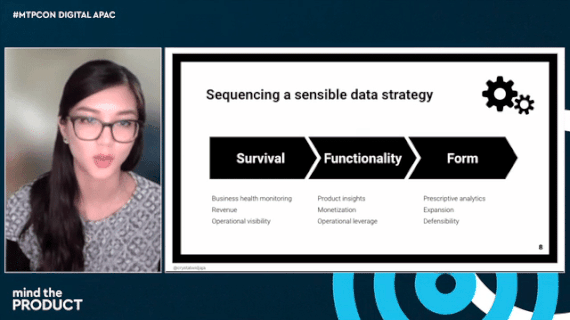Data Driven Product Management
There are many ways in which data-driven product management is described but, put simply, data-driven product management means making decisions based on real-world information. Understanding data-driven product management can help you to use the right data, uncover the right insights, and ultimately build the right product.
FEATURED CONTENT
LATEST POSTS
Keeping Track Of Your HEART - Tomer Sharon on The Product Experience
There’s a lot of debate in the product and research communities about quantitative vs qualitative approaches to metrics, so we sat down with Tomer Sharon (MD/Head of User Research and Metrics at Goldman Sachs) to talk about how he uses Google’s HEART approach to track what matters. Formerly of Google and WeWork, Tomer talks about Read more »
Ground Rules for Applying AI to Product Management
The hype around artificial intelligence (AI) and machine learning has led to lots of jargon, so that this very powerful technique has become more difficult to understand. The tips below have all helped me, so I hope this article will help product managers to cut through the noise and better understand how AI can fit Read more »
Optimal Matching for Marketplace Startups and the Role of Bias
While matchmaking is a core lever of any marketplace business, data crunched by Uber, Airbnb, and other marketplaces shows that engineering an optimal marketplace sometimes defies common sense. For example. You finish dinner and are ready to head home. You see plenty of Uber drivers, but you’re matched with a car 10 minutes away. It Read more »
Data-driven blunders and how to avoid Them
Jorge Rodriguez-Ramos considers how you can best incorporate data-driven decisions into product management. Read more »
Socially Preferable by Nathan Kinch
In this ProductTank London talk, Nathan Kinch, CEO at Greater Than X, examines the issues of ethics, privacy, and trust. He looks at how product managers can kick-start their ethics journey and ship products that make life better for everyone. The Edelman Trust Barometer is a resource that measures levels of trust in different contexts. It Read more »
They're Just Fancy Averages by Ben Fields
In this ProductTank London talk, Ben Fields, formerly Lead Data Scientist at FutureLearn, looks at getting the most from the relationship between product managers and data people, working out people’s background understanding, the benefits of leading with a story, and how best to spread knowledge. There are three key aspects of how data science can Read more »
Lessons From the Space Race: 3 Steps to Better Product Decisions
What makes a great product decision? The answer to this question is like the Holy Grail of product management: it promises success and prosperity but no clear evidence that it exists. In this post I examine the way I think about the path: what has worked for me and helped me grow as a product Read more »
How to fix Your Product Goals for Better Human Outcomes
Hello product designers, this is for you. I want to talk to you about product goals, metrics, and how they get muddled in the product design process, leading to some less than humane outcomes. But first a little story. In the early 1970s, two behavioural scientists working at Princeton University set out to investigate the psychology Read more »
Killing Zombies - Lisa Long on The Product Experience
Ash Williams (Evil Dead); Columbus, Tallahassee, Wichita and Little Rock (Zombieland); Shaun (Shaun of the Dead); Alice (Resident Evil); Lisa Long (ProductTank). All have killed zombies, and entertained us as they did so… but only Lisa did so on stage at London’s ProductTank, giving us practical advice on how to kill off zombie features and Read more »
Talking About Data Science by Jenessa Lancaster
Jenessa Lancaster is a data scientist at Ocado Technology. In this ProductTank London talk, she discusses the importance of communicating data concepts to non-specialist audiences. We live in promising times for data science in business development. Many organisations are increasing investments to their data science and machine learning departments, acknowledging the valuable insights that these Read more »




